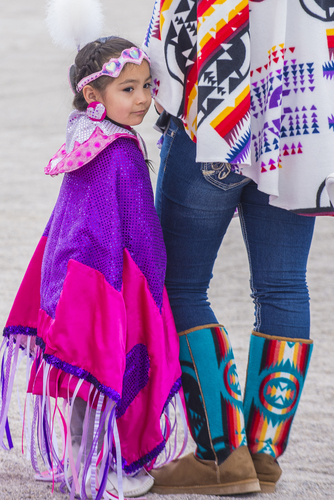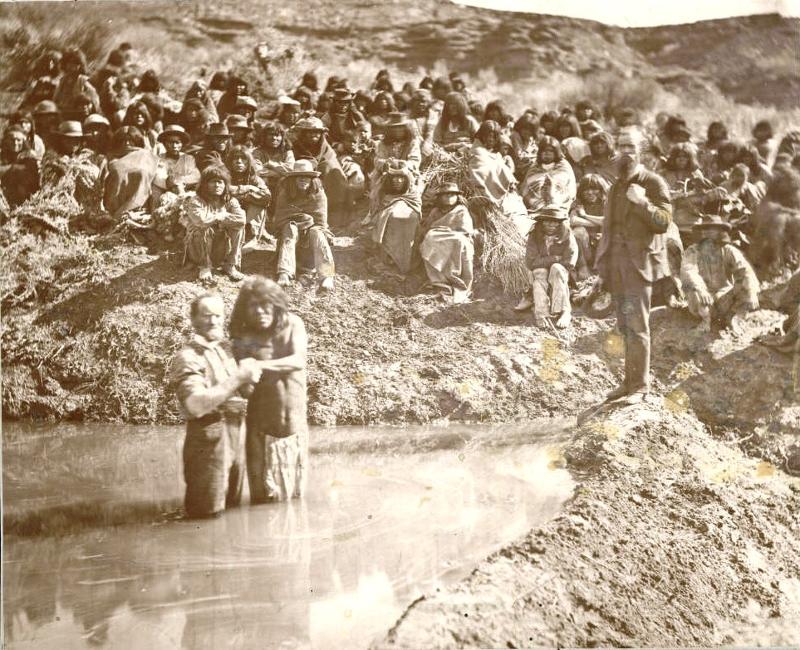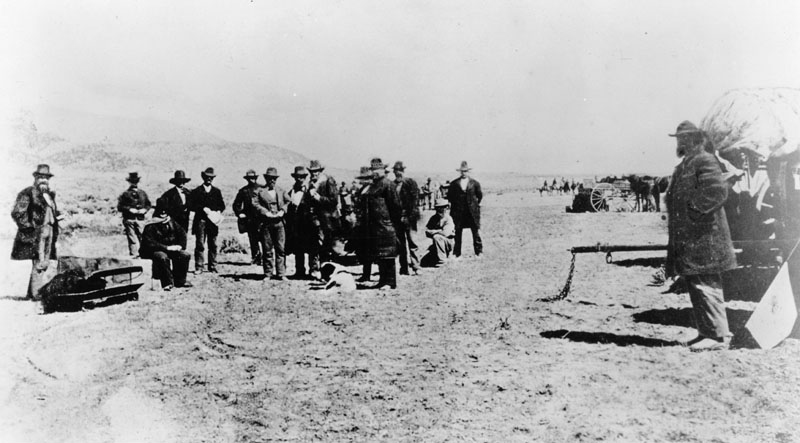Later History
Relations between the Mormons and the Paiutes were equivocal. Lacking access to the lands capable of supporting their foraging lifestyle, the Paiute became dependent on the Mormons for wage jobs. With the abolishment of slavery by the Mormons they no longer had to worry about their children being stolen, but they did continue to lose them to Anglo servitude. The Mormons, who called the practice "purchasing [the Indians] into freedom," used indentured servitude to secure the rights to Paiute children. These children would be required to live with and work for a Mormon family for periods of up to 20 years. The Mormons were encouraged in this practice by church leadership who believed that it provided Paiute children with the opportunity to be educated and converted. Facing a choice of watching their children starve or be sold into servitude, many Paiute families chose the latter. The Mormons felt a particular obligation to convert the Indians because they believed they were the Lamanite tribe of Israel described in the Book of Mormon.
|
Source - https://upload.wikimedia.org/wikipedia/commons/a/a6/Baptism_of_Shivwits_Indians.jpg |
Mormon missionaries baptizing Paiute Indians in the Virgin River, 1875. Early Mormons believed that Native Americans were descendants of a lost tribe of Israel, and therefore believed they had a special duty both to treat them fairly (Brigham Young outlawed the owning of Native American slaves) and to convert them. |
One of the most controversial events in Mormon and Paiute history is the 1857 Mountain Meadows Massacre.This event occurred when a wagon train of emigrants making its way from Arkansas to California was attacked, ostensibly by Paiute Indians. After being held under siege for several days the emigrants were told by local settler John D. Lee that if they handed over their arms he would escort them to safety. They did so, but after following Lee out of the meadow all of the emigrants except for the youngest children were executed. Responsibility for the attack was initially pinned on the Paiute, but eventually several Mormon men (including John D. Lee, who confessed) were found to have been involved. Still unresolved today is whether any Paiute were involved at all and the degree to which the action might have been sanctioned by any of the Mormon authorities.
If the video is not working, click on the link - http://www.youtube.com/watch?v=U8kcqpTkj6k
|
Source - https://commons.wikimedia.org/wiki/File:John_D._Lee_pre-execution_photo.png |
John D. Lee (seated next to the coffin), shortly before his execution at the site of the Mountain Meadows massacre in 1877. Although he confessed to the crime, Lee claimed that he had been acting on instructions from Mormon authorities, who encouraged the attackers to dress as Paiutes so that the Paiutes would be blamed. "I have been sacrificed in a cowardly, dastardly manner," were his last words. |
By the 1860s, the Paiute had been reduced to poverty. Some Paiutes, especially those who had horses, responded to their impoverishment by raiding settlements and wagon trains. As troubles with the Paiute escalated, the federal government responded by creating reservations where the Paiute could be confined. In 1872, the first Paiute reservation was established near Moapa. Other reservations soon followed, though most were too small to support the Paiute population. As a result, most of the Paiute left the reservations to in search of jobs.
In 1954, five Utah Southern Paiute tribes were terminated under a newly established policy that would end the trust relationship between the federal government and Indian tribes (see Module 2). Under this policy, tribes were to lose their lands, governmental services, and federal recognition as tribes. In theory, termination was to be restricted to those tribes that were "ready" for it; that is, those tribes whose members were sufficiently enculturated to leave reservation life and who lived in areas having sufficient wage opportunities to allow them to do so. Studies were done, and the Utah Paiute were deemed not ready for this transition. Nonetheless, for political reasons they were terminated anyhow. The consequences were drastic and ushered in a 25-year period of poverty and hopelessness for the Utah Paiute. After a long struggle, they had their federal recognition status restored in 1980 and united to form the Paiute Indian Tribe of Utah. Since that time, the tribe has fought successfully to reverse the economic free fall that its members experienced during the years of termination; its successes include a dramatic decrease (from 40% to 3%) in the high school dropout rate, the improved health and longevity of its people, and a growing sense of pride in their heritage.
 Today, there are five federally recognized Southern Paiute tribes and two major Southern Paiute Reservations (the Moapa River Paiute Reservation and the Kaibab Paiute Reservation). Other smaller reservations and landholdings are found near Las Vegas, in southern Utah, and within the boundaries of the Navajo reservation. Because of the small size of these reservations, most Southern Paiute live off the reservation, but they retain a strong sense of identity with their Paiute heritage.
Today, there are five federally recognized Southern Paiute tribes and two major Southern Paiute Reservations (the Moapa River Paiute Reservation and the Kaibab Paiute Reservation). Other smaller reservations and landholdings are found near Las Vegas, in southern Utah, and within the boundaries of the Navajo reservation. Because of the small size of these reservations, most Southern Paiute live off the reservation, but they retain a strong sense of identity with their Paiute heritage.
Native American girl at the Annual Paiute Tribe Pow Wow held in Las Vegas, 2015.
Source - Shutterstock - Image ID:293320412


